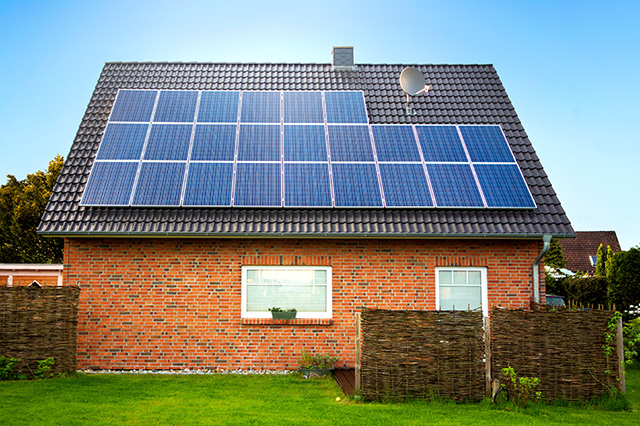How do solar energy systems work?
Solar panels are made up of silicon, which is a conductive material, meaning it conducts energy. When sunlight hits the silicon of a solar panel, electrons in the cells begin to move, initiating electrical currents. This produces direct current or DC electricity.
However, most appliances in your home use alternating current or AC electricity, for power. A solar inverter changes the DC electricity from solar panels into usable AC electricity for your home or business.
Is solar worth it in the Northeast?
Yes! Surprisingly, the Northeast is home to some of the best solar states. While the region experiences fewer sunny days than other parts of the country, many northeast states have higher-than-average electricity rates and advantageous solar incentives that afford property owners a quick payback and significant savings from their solar investment.
Do solar panels work in the winter?
Yes, solar panels work during the winter. In fact, cold weather improves the performance of solar panels.
However, most people in the Northeast experience lower overall solar production during winter months because the days are shorter; having fewer hours of sunlight means less electricity from your solar panels. Additionally, if your solar panels are covered in snow, they cannot generate electricity. That said, you don’t need to worry about clearing snow off your system – most solar panels are installed at a tilt and snow slides off on its own when the sun comes out, just like it naturally slides off your roof.
Can I meet all my electricity needs with solar?
Yes. Thanks to a policy called net metering, you can cover all your electricity needs with solar panels even though they aren’t producing power 24/7.
When your solar panels generate extra solar electricity during the day, that electricity is sent to the grid in exchange for a credit. You can then use these credits at times when your solar panels aren’t generating enough electricity to keep up with your demand, like at night. Over the course of a month, if your net electricity usage from the grid is negative (i.e. you sent more electricity to the grid than you drew from it), you will have a credit that you can apply towards future months.
Net metering is currently available in all northeast states, but the policy can vary slightly from utility to utility; be sure to check with your utility company about their specific net metering policies.
How long do solar panel systems last?
Solar panels are very durable and typically require very little maintenance over their lifetime. The solar panels you install today will generate electricity for more than 30 years. As an added bonus, solar panel manufacturers provide warranties that guarantee certain levels of performance for 25 years or more, guaranteeing your solar energy for decades to come.
Is my roof suitable for solar?
Solar panels are compatible with most roof types. However, some rooftops are more suitable for solar than others depending on their size, pitch, age and material. Southern-facing roofs with little to no shade are ideal for solar production. You also don’t want to install solar panels on an old roof towards the end of its life so you can avoid uninstalling and reinstalling your solar panel system to replace your roof.
Fortunately, if you can’t or don’t want to install solar on your roof, there are alternatives to consider, such as ground mounts or carports.

Will installing a solar panel system damage my roof?
No, roof damage as a result of installing solar panels is extremely rare.
With most traditional rooftop solar mounting systems, installers will drill holes into your roof. However, flashing and sealants are used to ensure that water does not leak through the holes, which are entirely sealed. Working with a professional, experienced installer is the best way to minimize any risk of roof damage from solar panels.
How many solar panels do I need?
The average homeowner requires 28 – 34 panels to generate all of their electricity needs, but you may need more or less depending on how much electricity you use, where you live, the efficiency of your solar panels and the specifics of your property and solar array. When installers provide a custom quote for your property, they use solar design tools that take all these factors and more into account in order to provide the best system for your needs.
Will I still receive an electric bill after going solar?
In most situations, yes. Most solar panel systems are grid-tied, meaning they are still connected to the electrical grid. This allows you to easily pull electricity from the grid when you need it, as is the case under net metering as described above.
Your monthly electricity bill may still include fixed charges from your utility company regardless of your solar energy system’s production, such as a customer service fee. However, if your utility company offers net metering, your bill should only include charges for any extra electricity you use from the grid and may be very close to zero.
How much does it cost to install a solar energy system?
The cost of a solar energy system varies depending on a number of factors, including the size of your system, the quality of solar equipment you install, any available incentives and where you live.
Most homeowners buying a solar panel system in the Northeast pay between $26,000 to $34,000 for a solar panel system before any incentives. When taking into account the 26% federal investment tax credit available in 2020, the average cost of solar in the Northeast drops $19,240 to $25,160. Most states in the Northeast also have state or utility-specific incentives that help homeowners achieve a quick payback for their investment: most solar panel systems pay for themselves in 5-11 years, depending on the state and availability of incentives.
Tools like the EnergySage Solar Calculator use market data to provide you with a quick estimate for solar costs and savings given your, property and financing preference.
What financing options are available for solar?
There are many options available for financing solar projects. If you’re interested in owning your solar panel system, many credit unions and specialized lenders offer solar loans with terms ranging from 5 to 20 years. Zero down options are available for those who don’t want to make a down payment.
Alternatively, you can finance your solar panel system with a solar lease or power purchase agreement (PPA). This arrangement is like leasing a car. A solar company would own your system and install it on your roof for no upfront cost and you would pay monthly payments to the company in exchange for the solar electricity the panels generate. Since you don’t own the system, you’re not responsible for any required maintenance. However, those who lease solar panel systems also can’t take advantage of many federal and state solar incentives because the owner of the system, the solar company, claims the incentives for themselves.
Learn more about your solar financing options and how they differ from one another.
How much money can I save with solar?
Even after taking into account the cost of your solar panel system, the average homeowner will save anywhere between $10,000 to $30,000 over the lifetime of a solar panel system. Overall savings depend on the cost of your system, how and if you finance, how much solar electricity it generates, your current electricity rate and any future increases in the cost of electricity from your local utility.
Much of the savings associated with solar are the avoided costs of paying your utility company. Because Northeast states pay more for electricity than many other states, savings estimates for solar in the Northeast tend to be on the higher end of the above range.
The EnergySage Solar Calculator and other tools can provide you with a ballpark savings estimate given your monthly electricity bill costs, property, geography and the incentives available in your area.
What incentives are currently available for installing solar?
One of the best incentives for buying a solar panel system is the federal investment tax credit (ITC). This tax credit allows you to use 26% of your total solar costs as a credit towards your federal taxes in 2020. This credit was 30% in 2019 and will drop to 22% in 2021.
Additionally, many states, cities and utility companies also offer their own solar incentives. Massachusetts and New York both offer their own state tax credit, while states like Rhode Island, New Hampshire and Connecticut provide rebates to help decrease the upfront costs of installation.
Learn more about the incentives you may be eligible for when you go solar in the Northeast.
What’s the best solar equipment available?
Just as with other electronics, there’s a range of quality when it comes to solar equipment. Products differ in performance, efficiency, aesthetics, durability and more. It’s important to understand the quality of your equipment in order to make sure you’re paying a fair price for it. The EnergySage Buyer’s Guide is a helpful tool to compare the most important metrics across different types of solar panels, inverters and batteries.
Should I buy a solar battery?
More and more people are pairing their solar panel systems with a battery, which allows you to store solar electricity on-site instead of feeding it back into the grid. Batteries are particularly useful during power outages if you want to keep your appliances running on solar power even when the grid is down.
Adding a battery to your solar panel system will increase the upfront cost of installation; however, battery costs continue to decline, and some states and utility companies offer incentives that can help decrease the costs even further.
Learn more about if solar power is right for you and your home. Before you start installation, talk to an insurance agent to see how you’ll be covered.















